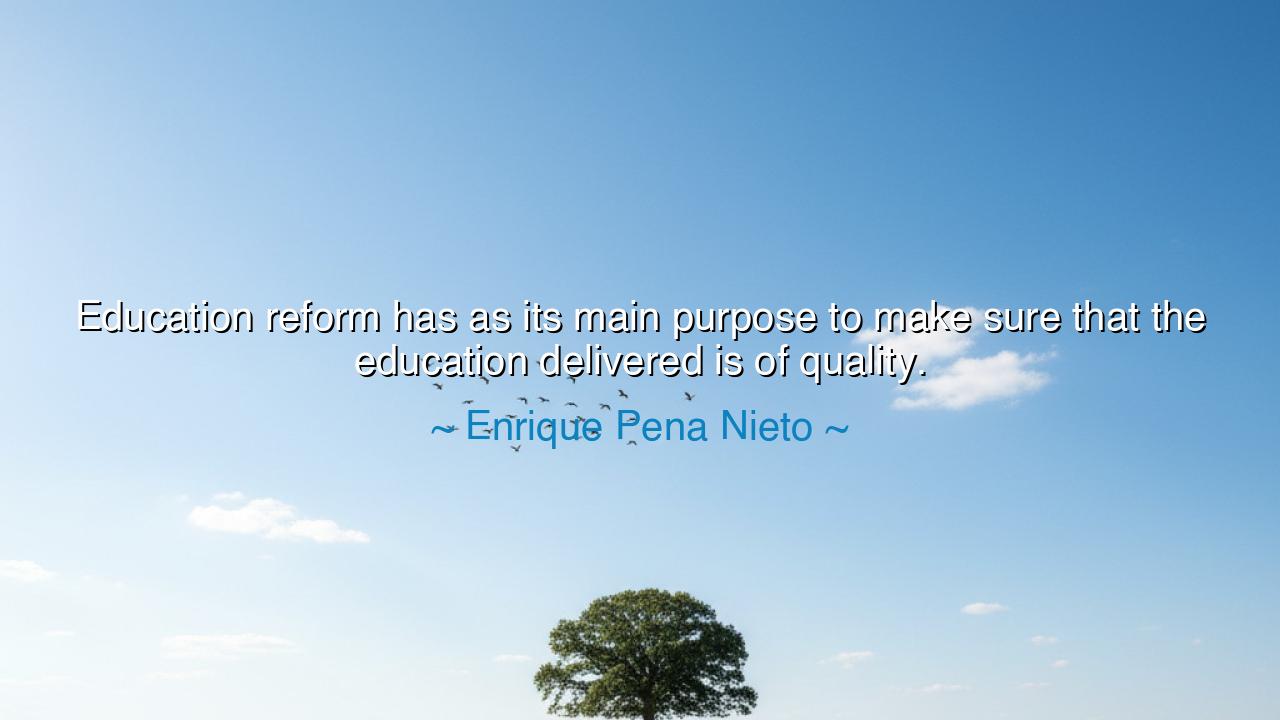
Education reform has as its main purpose to make sure that the
Education reform has as its main purpose to make sure that the education delivered is of quality.






Hear the words of Enrique Peña Nieto, who once proclaimed: “Education reform has as its main purpose to make sure that the education delivered is of quality.” These words, though simple in their form, strike at the heart of civilization itself. For what is a nation, what is a people, without the strength of their learning? Education is the fountain from which progress flows, and if that fountain is impure or shallow, the whole body of society will thirst and grow weak. Reform, then, is not mere adjustment—it is the act of cleansing and deepening the well from which all generations must drink.
To speak of education reform is to acknowledge that the old ways have faltered, that the system entrusted with shaping young minds has grown weary or uneven. The task is not only to spread schools and teachers across the land, but to ensure that the learning offered is of true quality—knowledge that awakens the mind, skills that equip the hands, wisdom that strengthens the soul. For to offer poor instruction is no better than to offer no instruction at all, for it deceives the child with the illusion of learning while leaving them unarmed against the challenges of the world.
History offers us a vivid example in the reforms of Horace Mann, the father of public education in the United States. He looked upon the schools of his time and saw neglect, disorder, and inequality. Children of the poor received little, while the rich had tutors and academies. Mann declared that education must be universal, free, and of quality, so that the destiny of a child would not be bound by wealth but by their own effort and virtue. His reforms did not merely build schools; they built the very foundation of democracy, for he believed that “education is the great equalizer.”
The same truth has been seen in other lands. When Japan emerged from centuries of isolation in the Meiji era, its leaders knew that to stand among the nations, they must first reform their education. Schools were opened, teachers trained, and quality became the watchword of their new system. In a single generation, a nation once considered feudal and backward rose to industrial and intellectual power. Their story teaches us that reform in education is not only about classrooms but about the future strength of the nation itself.
Peña Nieto’s words, then, carry both urgency and hope. He reminds us that the goal is not reform for its own sake, not the empty boasting of change, but reform directed toward quality. Every child deserves not just a seat in a classroom but a teacher who inspires, materials that enlighten, and an education that equips them to live fully and freely. Anything less is a betrayal of the sacred trust between generations.
The lesson for us is clear: we must never be content with the appearance of schooling, but must always seek its quality. Parents, teachers, leaders, and citizens alike must demand that the knowledge offered to the young is true, relevant, and empowering. For the destiny of a people is written in the minds of its children, and if their education falters, so too will the nation.
And what actions must we take? Support reforms that aim not at profit or vanity, but at quality for every student. Honor and equip teachers, for they are the carriers of civilization’s flame. Provide resources where they are lacking, and hold systems accountable where they fail. Above all, cultivate in yourselves and in your children a love for lifelong learning, for no reform can succeed without hearts eager to grow.
Thus let these words endure as a commandment: the purpose of education reform is not expansion alone, but quality—for it is better to light a single true torch than to hand out a thousand dim and flickering flames. And when education shines brightly, the whole world is illuminated by its glow.






AAdministratorAdministrator
Welcome, honored guests. Please leave a comment, we will respond soon